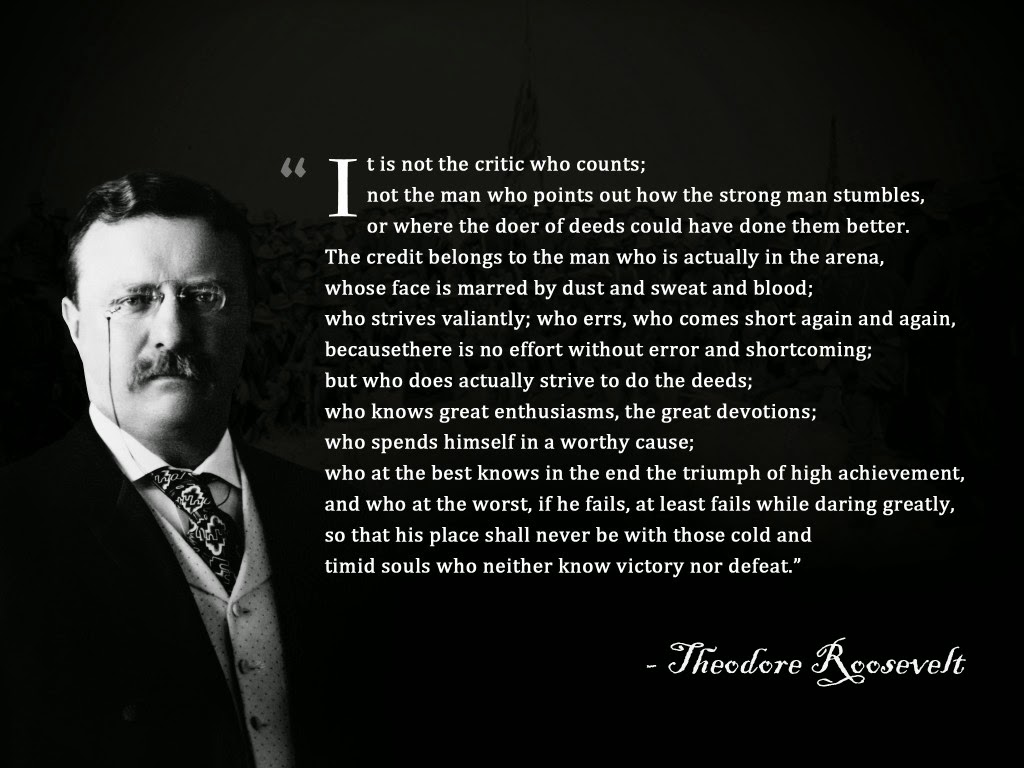In our quest to find the people we can be vulnerable with, who will listen without judging, who will not criticize, who will not shame us, who are genuinely interested in our brokenness, it may be helpful
to try to define what unsafe people “look like.”
I love this quote by Theodore Roosevelt. “It is not the critic who counts.”
Unsafe people:
- Abuse you. On any level.
- Regularly criticize you, shame you, or point out your failings.
- Don’t love you unconditionally – what they call love is really a transaction in which they are looking for an (at least) even exchange, a payback of some sort. This is often an emotional “twang” that leaves you confused and guilty.
- Compete with you. They do not genuinely appreciate you or your talents, but rather try to one-up you.
- Aren’t interested in your good character qualities or accomplishments, unless your reflection makes them look good.
- Seem to be more concerned with getting their own needs met than in growing a safe, transparent relationship with you.
- Make demands of you – on your time, your emotional reserves – but are usually not available when you need them.
- Are constantly in a crisis of their own.
- Are not interested in a reciprocal relationship. They want to dump, and dump, and dump some more, out of their own brokenness, but they are not interested in yours.
Sound harsh? It is. And you may be surprised to find that some of your relationships aren’t as reciprocal, as safe, as you thought they were.
** DISCLAIMER: I am no expert. How and with whom you choose to engage should be based on your own definition of what is good and safe for you.
But let me just say this: If you are in relationship with someone whose main method of interacting with you fits into one of those categories up there … take a hard look at it.
Then what?
There are several options, and which we choose depends on the nature of the relationship. We can do nothing. And nothing will change. And we can accept that.
We can confront. Perhaps the person is simply unaware of the way they relate to you, or perhaps you are reading them incorrectly. Be prepared to be wrong, but beware if they only deflect and defend themselves without hearing you.
We can take a time out. Think. Pray. Get advice from a neutral party. Get counseling. Often stepping back allows us to see more clearly.
Sometimes, it’s best to disengage. To put some distance between you and them (emotionally and/or physically). Often the relationship will just fade away when you stop giving giving giving.
Ideally, a broken relationship can be repaired and come out the other side of one or more of these steps safely. Sometimes this happens, often times it doesn’t.
But this:
You are valuable.
You are wanted.
You are known. Fully and completely.
You are accepted.
You may have never believed any of that. ANY of it. Because you may not have experienced the reality of how God sees you. Do you know? That He created you and knew you before you were born and continues to know you every minute every hour every day. And knowing you like this, even the parts you keep hidden, He sees you as so valuable that He offered His very life to cover yours. Your messy, imperfect life. To make you acceptable, just as you are. No strings, no surprises, none of that list up there factors into a relationship with God.
He is the very definition of safe.
We’ve only talked about what unsafe relationships look like today. But until and unless you understand God’s kind of safe, you won’t know what to look for. You might miss it even though it’s right in front of your face.
So while you’re narrowing your eyes to take a hard look at relationships that make you go, “hmmm …”, don’t get all cynical and resentful on me. There is safety to be found, and it is found first with the One who loves you perfectly. Sit with both – examine both – at the same time. Or go back and forth between them. Whatever works for you … just don’t lose hope and please please please anticipate good. God is good, and there are good.safe.people out there. For you. I promise.
Until next time,
Angie

Be First to Comment